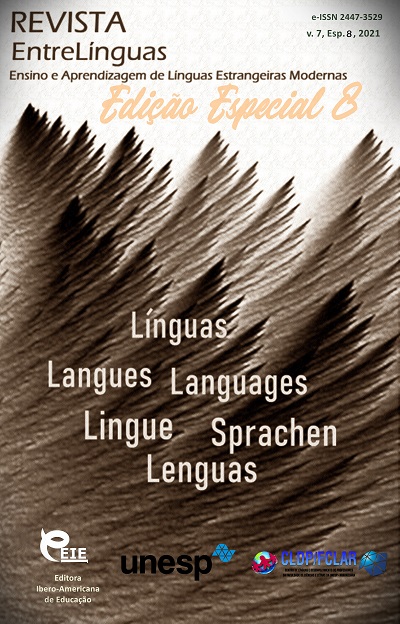The role of language and literature in popular culture
DOI:
https://doi.org/10.29051/el.v7iesp.8.16346Keywords:
Language, Cultural values, Popular culture, LiteratureAbstract
The literary values of language in a country play a unique role in the dynamics of the cultural values of that country and have a great place in polishing the cultural views of the inhabitants of a borderland. Furthermore, popular culture is one of the essential topics in the history of any country, the most important manifestation of which is popular literature, literature that recognizes the social interactions of people, type of clothing, national sounds, lifestyle, and beliefs. In the current study, cultural and social researches and their impact on social developments in novels, history, philosophy, theater, drama, allegory, and poetry, and prose are studied. In this regard, the sociology of literature as a social science shows its true function. this article analyzes the role of language and literature in popular culture. Its characteristics and topics have been compiled in a library method.
Downloads
References
BBC, (2019). Brazil’s President Bolsonaro cancels trip to New York. [Electronic source]. Available at: https://www.bbc.com/news/world-latin-america-48158876 (Accessed 06.04.2019).
Beach, D. (2012). Process Tracing methods – an introduction. 1st ed. [Electronic source] Denmark: University of Aarhus, 57 p. Available at: https://www.press.umich.edu/resources/Beach_Lecture.pdf (Accessed 06.04.2019).
BRICS = BRICS INFORMATION PORTAL, (2019). History of BRICS. [Electronic source]. Available at: http://infobrics.org/page/history-of-brics/ (Accessed 06.04.2019).
BRICS = BRICS INFORMATION PORTAL, (2019). Next BRICS Summit to Be Held in Brasilia on November 13-14. [Electronic source]. Available at: http://infobrics.org/post/28326/ (Accessed 06.04.2019).
Collier, D. (2011). Understanding Process Tracing. Political Science and Politics, 44(4), 823-830.
Gallego, E. (2018). How Bolsonaro came to pass [Electronic source] Rosa Luxemburg Stiftung. Available at: http://www.rosalux-nyc.org/how-bolsonaro-came-to-pass/ (Accessed 06.04.2019).
Glushkova, S., Lomakina, O., & Sakulyeva, T. (2019). The economy of developing countries in the context of globalization: Global supply chain management. International Journal of Supply Chain Management, 8(1), 876-884.
Gonzalez, E., & Leme, L. (2019). Tracking the First 100 Days of Brazilian President Jair Bolsonaro. [Electronic source]. Available at: https://www.as-coa.org/articles/tracking-first-100-days-brazilian-president-jair-bolsonaro (Accessed 06.04.2019).
Hammond, A. (2018). Brics seeks to shape New World Order. [Electronic source]. Available at: http://infobrics.org/post/27221 (Accessed 06.04.2019).
Hunter, W., & Power, T. (2019). Bolsonaro and Brazil’s illiberal backlash. Journal of Democracy, 30(1), 69-82.
Mengije, W., (2018). 10 Years on: How has BRICS Performed over the Last Decade? [Electronic source]. Available at: http://infobrics.org/post/27161 (Accessed 06.04.2019).
Ministry of Foreign Affairs. (2019). Speech by the President of the Republic, Jair Bolsonaro, at the Plenary Session of the World Economic Forum - Davos, Switzerland, January 22, 2019. [Electronic source]. Available at: http://www.itamaraty.gov.br/en/speeches-articles-and-interviews/president-of-the-federative-republic-of-brazil-speeches/19992-discurso-del-presidente-de-la-republica-jair-bolsonaro-durante-la-sesion-plenaria-del-foro-economico-mundial-davos-suiza-22-de-enero-de-2020 (Accessed 06.04.2019).
Muhandiram, N. L. (2019). Future of BRICS: BRAXIT or “Power Next”? [Electronic source]. Available at: http://infobrics.org/post/28277/ (Accessed 06.04.2019).
Penkovtsev, R., Nikulshin, G., & Zinnatullin, E. (2017). Strategic priorities in the Foreign Policy course of the USA in the system of Modern International Relations. National Academy of managerial staff of Culture and Arts Herald, 4, 227-230.
Penkovtsev, R.V., & Shibanova, N.A. (2015). Wars and military conflicts of the XXI century in the context of the strategic interests of the United States. Journal of Sustainable Development, 8(4), 164-168.
Popova, I.M. (2018). Predsedatel'stvo Brazilii v BRIKS v 2019 g.: chego ozhidat' ot nachala novogo desyatiletiya sotrudnichestva i administratsii Zh. Bolsonaru. Vestnik RUDN. Seriya: Mezhdunarodnye otnosheniya, 18(4), 925- 941 (in Russ.).
Presidency of the Republic of Brazil (2019). Bolsonaro makes proposals and strengthens ties with other countries. [Electronic source]. Available at: http://www.brazil.gov.br/about-brazil/news/2019/01/bolsonaro-make-proposals-and-strengthens-ties-with-other-countries (Accessed 06.04.2019).
Sergunin, A., & Gao, F. (2018). BRICS as the Subject of Study of International Relations Theory. International Organisations Research Journal, 13(4), 55-73.
Solano, E. (2018). The middle classes hate the Workers’ Party. [Electronic source]. International Politics and Society. Available at: https://www.ips-journal.eu/regions/latin-america/article/show/the-middle-classes-hate-the-workers-party-3013/ (Accessed 06.04.2019).
Spring, J., & Soldatkin, V. (2019). BRICS leaders rail against “bullying” protectionism [Electronic source]. Available at: https://www.reuters.com/article/us-brics-summit/brics-leaders-rail-against-bullying-protectionism-idUSKBN1XN1YY (Accessed 06.04.2019).
Zanini, F. (2019). BRICS Under New Brazilian President. [Electronic source]. Available at: http://infobrics.org/post/28053 (Accessed 06.04.2019).
Downloads
Published
How to Cite
Issue
Section
License

This work is licensed under a Creative Commons Attribution-NonCommercial-ShareAlike 4.0 International License.
Os manuscritos aceitos e publicados são de propriedade da Revista EntreLínguas. Os artigos publicados e as referências citadas na Revista EntreLínguas são de inteira responsabilidade de seus autores.
Transferência de direitos autorais – autorização para publicação
Caso o artigo submetido seja aprovado para publicação, já fica acordado que o(s) autor(es) autoriza(m) a UNESP a reproduzi-lo e publicá-lo na EntreLínguas, entendendo-se os termos “reprodução” e “publicação” conforme definição respectivamente dos incisos VI e I do artigo 5° da Lei 9610/98. O artigo poderá ser acessado pela rede mundial de computadores (Internet), sendo permitidas, a título gratuito, a consulta e a reprodução de exemplar do artigo para uso próprio de quem a consulta, desde que haja a citação ao texto consultado. Essa autorização de publicação 328 EntreLínguas, Araraquara, v. 1, n .2, p. 323-328, jul./dez. 2015 não tem limitação de tempo, ficando a UNESP responsável pela manutenção da identificação do(s) autor(es) do artigo. Os artigos publicados e as referências citadas na Revista EntreLínguas são de inteira responsabilidade de seus autores.











